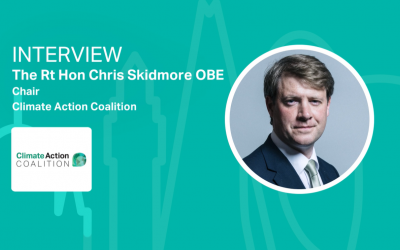Karen Shackleton on the need for pension funds to take a consolidated approach to ESG
Ahead of the Sustainable Investment Forum Europe, Karen Shackleton, Director at Pensions for Purpose, spoke to Climate Action about the need for pension funds to take a consolidated approach to ESG and how developing frameworks will help asset owners introduce common standards.

Ahead of the Sustainable Investment Forum Europe, Karen Shackleton, Director at Pensions for Purpose, spoke to Climate Action about the need for pension funds to take a consolidated approach to ESG and how developing frameworks will help asset owners introduce common standards.
Do you think pensions have an ESG problem in that they have good intentions though poor execution?
Most pension funds that I speak to are extremely aware of the importance of ESG. The challenge comes in implementation. I do see examples of best practice, however, and this is where pension funds are clear about their investment beliefs, those which have agreed a set of priorities (for example, gender diversity, climate action, or social issues), and those which are clear as to how they can be most effective in achieving their goals. For example, a fund may decide to prioritise gender diversity, and agree that they will be most effective through shareholder engagement, by voting at AGMs and by challenging their asset managers on their own gender diversity and gender pay gaps. That is a very clear set of goals. Another fund may want to prioritise climate action, but feel they will be most effective by being an active shareholder, by switching to sustainable, low carbon investment strategies, and by investing impactfully in renewable energy. Equally clear, but achieving the goals by becoming more purposeful in the style of investment. Where I think pension funds can go wrong is lack of clarity with what they are trying to achieve. The result is a somewhat piecemeal, scattergun approach to ESG, which leaves everyone feeling uncertain of the outcomes being achieved.
Is good governance the key criteria for any investment?
Good governance is a key criteria for most successful initiatives, not just investment. In analysis that I have seen from asset managers, the evidence suggests that, of the E, S and G it is the G that has added most value to the portfolio return. Yet it can be a challenge to shift a governance structure away from the status quo with internal resistance to any change. It requires a strong Chair and a supportive and self-reflective pensions committee who are willing to embrace a new way of working.
Is it possible for pension funds to maximise opportunities whilst minimising the risks associated with the transition to a low carbon economy?
There are many opportunities associated with the transition to a low carbon economy. Some of those will be obvious: renewable energy, vertical farming, and sustainable fabrics, for example. However, I'm also of the opinion that there are opportunities from investing in companies who are just about to respond to the transition pathway, yet on current criteria appear to be behind the curve. This means keeping an open mind and carrying out detailed due diligence on potential investments. I have never been of the view that investing in environmentally supportive companies automatically means giving up return, but equally selecting only the narrowest universe of opportunities (e.g. those with the highest ESG scores) might mean missing out on some potentially interesting and rewarding investments.
How much is greenwashing a problem in the industry and is this compounded by self-reporting on ESG criteria?
I hear a lot from asset managers who talk about the perils of greenwashing, yet it's difficult to really know how much of an issue this really is, across the industry. I take a pragmatic approach when speaking to pension funds. We are all on a journey and if that means taking a first step and investing in a fund that perhaps is greenwashing a little, but which is more in the pension fund's "comfort zone" (e.g. style of investment, the manager's name, the financial criteria), then at least it allows you to learn about impact, to become more discerning, to challenge the manager and, ultimately, to replace them if they don't meet your required standards over time. In terms of reporting on ESG, this is a really fast moving space. Part of the problem is that different firms use different methodologies which in turn can lead to differing assessments on the ESG qualities of a given investment. However, over time I would expect more consensus on the best way to assess ESG and we are already seeing frameworks such as the Impact Management Project being developed, which are designed to help asset owners introduce common standards.
Environmental and sustainable investment can make society more equitable and healthier - do you think that the COVID-19 pandemic has shone a much-needed light onto the importance of ESG?
Absolutely, but my great fear is that lessons won't really be learned and society will gradually drift back to the old way of operating. However, there was already momentum building around ESG, and purpose, before the pandemic hit, so my hope is that our experience over the past year will feed that momentum by bringing to light the importance of investing in a sustainable world for the next generations.
Karen will be speaking at the Sustainable Investment Forum Europe in April, bringing together asset owners and managers, ratings agencies, banks, UN and Government policymakers, investors, development banks, think tanks, and NGOs committed to driving forward the sustainable finance agenda. Register your place for free here.





